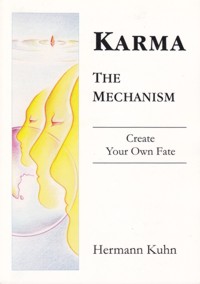
Ato(a)nyatpapam (26)
Negative karma brings about a disagreeable subjective feeling of life and often blocks or obstructs inner growth.
Negative karma (paapa) is also always and exclusively the result of our very own actions and attitudes. Uncomfortable circumstances of life, problems, lack of recognition etc. demonstrate vividly that we now or at an earlier time created the basis for this problematic environment or negative emotional state all by ourselves through our own emotional attachment to limiting themes of life. Since this (personal) karma will manifest in any case, we should not try to ignore it.
Though the manifestation of negative (as well as positive) karma is limited in time, negative karma has the unpleasant characteristic to easily produce new karma of the same type upon its manifestation. This is caused by a renewed (intense) emotional reaction when we experience the results of the (previously bound) negative karma. To break out of this vicious circle of constantly repeating experiences we need to become aware of this automatic mechanism.
As long as we do not dissolve our emotional attachment to limiting themes of life - i.e. as long as our interactive karmic field still contains the respective karmic molecules - we cannot prevent the manifestation of negative karmas. Yet all manifestation of negative karma is always and only an indication that at this very moment the bond between us and the respective amount of karmic molecules is in the process of being dissolved.
Any attempt to locate the cause for negative situations outside of us - as is customary in the (flawed) Western understanding of the world's mechanisms - will never give us access to the real cause of negative circumstances. In this case we will remain unable to prevent the renewed occurrence of unpleasant experiences.
The mechanism is very simple: Whoever sustains the idea that he cannot influence the occurrence of negative events, will easily react with animosity, anger, disappointment etc. at any restriction of his positive feeling of life. Yet this very (passionate) reaction is the root cause for a renewed bond to the same type of (negative) karma.
Any (renewed) passionate reaction only confirms that a certain theme of life has not yet been concluded. It is an indication that we - consciously or subconsciously - want further confrontation with this particular theme. It is not conducive to the solution of this situation if we interpret this mechanism negatively.
When we intentionally promote, enjoy or prolong negative emotions, we also cause new attachment to the same type of karma.
Attempts to ignore disagreeable experiences do not remove the irritation. They may only shift our inevitable confrontation with a particular theme into the future.
If we desire the fundamental conclusion of a theme of life, it helps to react to negative emotions
- by examining in a distanced way whether we only project these emotions onto events, persons or objects that have no direct connection with the dissolution of karma we currently experience
- by reflecting what the real source for these emotions may be, why they are happening, and what would happen if we allow them free reign
- by asking ourselves whether we need to react at all and
- by consciously deciding to follow a different - positive - line of thought or action.
As a rule of thumb any poised, neutral attitude at the occurrence of negative emotions and experiences assures that we bind no further karma of the same type.
That the manifestation of negative karma brings about unpleasant experiences is a fact of our present life. It makes no sense to intensify this process by adding further negative emotions to it. True - some variations of karma do obstruct inner growth, - but everyone seriously interested in the theme of this book already is the living proof that his or her expansion of consciousness is - temporarily - not blocked any more.
We take it as a self-evident natural fact that disagreeable experiences are limited in time. Yet a similar limitation of positive circumstances we definitely would not want to consider. We regard it as our inalienable and basic right that agreeable circumstances of life should continue forever.
And with this we have exactly the right notion. We sense - consciously or unconsciously - a state of existence where no karma obstructs any of the immense abilities we so deeply feel within us.
It may not always be easy to recognize the path to this stage of development. Though scriptures like the Tattvarthasutra describe this mechanism in great detail, it initially takes effort to eliminate inner obstacles, interference and prejudice. Whoever decides for this path should be aware that it takes considerably more energy and dedication to develop a new understanding that departs substantially from our prevalent Western thinking, than to continue one's life in a well-established and changeless pattern.
Yet all blocks, restrictions and efforts on this path are an integral part of the existence we caused for ourselves. Once we stop regarding these obstacles as insurmountable barriers and begin to interpret them as challenges that make us grow and exercise our inherent abilities, we are well on our way to a more dynamic and far broader scope of life.
 Hermann Kuhn
Hermann Kuhn
